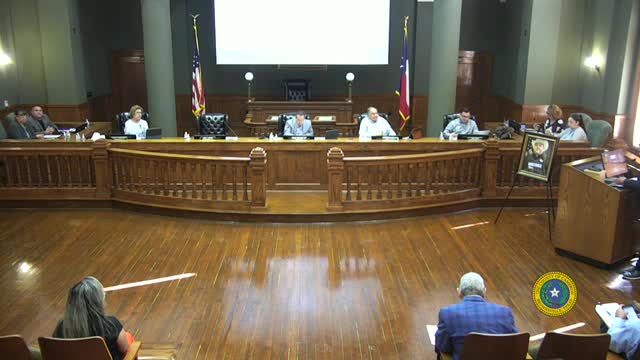Cameron County tables proposed ICE MOU after community members urge delay
September 30, 2025 | Cameron County, Texas
This article was created by AI summarizing key points discussed. AI makes mistakes, so for full details and context, please refer to the video of the full meeting. Please report any errors so we can fix them. Report an error »

The Cameron County Commissioners Court on Tuesday voted to table consideration of a proposed memorandum of understanding with U.S. Immigration and Customs Enforcement, after several community speakers urged the court to delay action and seek more information.
The MOU relates to local implementation of federal immigration enforcement programs tied to what speakers repeatedly identified as “287(g)” and to state law they described as Senate Bill 8. Osvaldo Grimaldo, identified in public comment as a policy and advocacy strategist with the American Civil Liberties Union of Texas, told the court the county “has ample time to evaluate whether they have the necessary resources, such as personnel, funding, and capacity to properly implement” the agreement and warned that “entering into an agreement prematurely ... risk[s] stretching our officers too thin and disrupting the community trust we have established here in Cameron County.”
The issue drew multiple public speakers who asked the court to choose the least-harmful option among 287(g) models. Michael Mireles, speaking as a LUPE member, urged the court to select a “warrant service officer” model, saying the task-force approach has “led to patterns of discrimination” and would be more harmful to immigrant communities. Other speakers with LUPE and allied groups echoed that request.
County officials said backup materials for the item were not attached to the meeting packet, and the court voted without discussion to delay the item so staff and the public could review the agreement. Commissioner Benavides moved to table the item; the motion was seconded and carried by voice vote.
Why it matters: speakers emphasized that the county faces a December 1, 2026 compliance deadline referenced in public comment but argued that more than a year remains to assess operational capacity and community impacts. Advocates said premature adoption could undermine trust and discourage victims and witnesses from contacting law enforcement.
What happened next: The court did not take substantive action on the MOU; the item was tabled for further review and follow-up. Several advocates asked to meet with county officials and staff to discuss models and public outreach.
Court action recorded: Motion to table the MOU passed by voice vote; no further action on the MOU was recorded at the meeting.
The MOU relates to local implementation of federal immigration enforcement programs tied to what speakers repeatedly identified as “287(g)” and to state law they described as Senate Bill 8. Osvaldo Grimaldo, identified in public comment as a policy and advocacy strategist with the American Civil Liberties Union of Texas, told the court the county “has ample time to evaluate whether they have the necessary resources, such as personnel, funding, and capacity to properly implement” the agreement and warned that “entering into an agreement prematurely ... risk[s] stretching our officers too thin and disrupting the community trust we have established here in Cameron County.”
The issue drew multiple public speakers who asked the court to choose the least-harmful option among 287(g) models. Michael Mireles, speaking as a LUPE member, urged the court to select a “warrant service officer” model, saying the task-force approach has “led to patterns of discrimination” and would be more harmful to immigrant communities. Other speakers with LUPE and allied groups echoed that request.
County officials said backup materials for the item were not attached to the meeting packet, and the court voted without discussion to delay the item so staff and the public could review the agreement. Commissioner Benavides moved to table the item; the motion was seconded and carried by voice vote.
Why it matters: speakers emphasized that the county faces a December 1, 2026 compliance deadline referenced in public comment but argued that more than a year remains to assess operational capacity and community impacts. Advocates said premature adoption could undermine trust and discourage victims and witnesses from contacting law enforcement.
What happened next: The court did not take substantive action on the MOU; the item was tabled for further review and follow-up. Several advocates asked to meet with county officials and staff to discuss models and public outreach.
Court action recorded: Motion to table the MOU passed by voice vote; no further action on the MOU was recorded at the meeting.
View full meeting
This article is based on a recent meeting—watch the full video and explore the complete transcript for deeper insights into the discussion.
View full meeting
